
If your loved one recently passed away, you may have many questions about filing income tax for them. Perhaps the most important thing is to understand that you are not alone. Dealing with a deceased’s unpaid taxes can be challenging. For example, who is responsible for paying taxes when someone dies? Do IRS debts go away after death? Should you pay a person’s back taxes after death? If yes, how do you even file the returns?
These questions linger in many people’s minds, so we have answered them to help you understand your rights and responsibilities. Knowing what to expect can make the process go more smoothly.
Can a Deceased Person Owe Taxes?
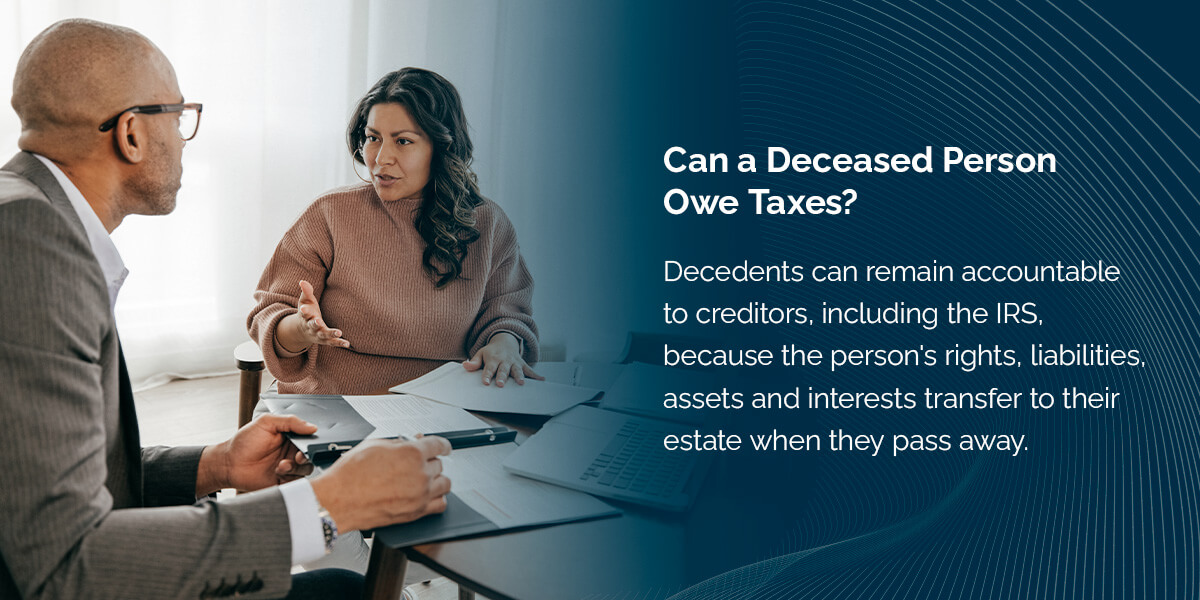
Decedents can remain accountable to creditors, including the IRS, because the person’s rights, liabilities, assets and interests transfer to their estate when they pass away. So when a person passes away, the executors or administrators of their estate step into their shoes. Executors can claim rights due to the deceased person and are liable to cover unpaid taxes.
Generally, the IRS or relevant tax authority can only claim unpaid taxes through the deceased’s estate. If the person dies without assets, the taxes may go unpaid. Tax laws vary depending on the circ*mstances, so it’s always advisable to seek professional advice.
Do You Have to File Taxes on a Deceased Person?
If you are responsible for the deceased person’s estate, you may be required to pay past, present and future taxes. Past taxes are those which accrued during their lifetime but were unpaid. Examples are back taxes with interests and penalties. Present taxes are those that accrued at the time of death.
You may also be required to pay future taxes if you manage the deceased’s estate for a while after they pass away. For instance, if the estate includes undistributed shares in a company that still yields dividends, you may required to pay taxes on incoming returns. Another example would be when you continue to receive rent on behalf of the estate.
Is IRS Debt Forgiven at Death?
Unpaid taxes are not automatically forgiven at death. As earlier indicated, the balance usually falls into the estate. When there are no assets to pay the taxes, they may be forgiven. However, tax liabilities are typically unrelenting.
What Happens if a Deceased Person Owes the IRS?
When a person dies, their unpaid taxes become part of their estate. Where necessary, the IRS or relevant tax authority can claim the outstanding amount with interests and penalties. If the person dies without assets, the IRS can encounter challenges retrieving the amount.
The person managing the deceased’s estate must file all tax returns with the IRS. They may do so themselves or hire a professional for assistance. Where the estate’s worth is insufficient to cover the taxes, the executor may have to prioritize paying taxes before making distributions to the beneficiaries. Unpaid taxes do not automatically disappear.
Who Is Responsible for a Deceased Person’s Tax Balance?
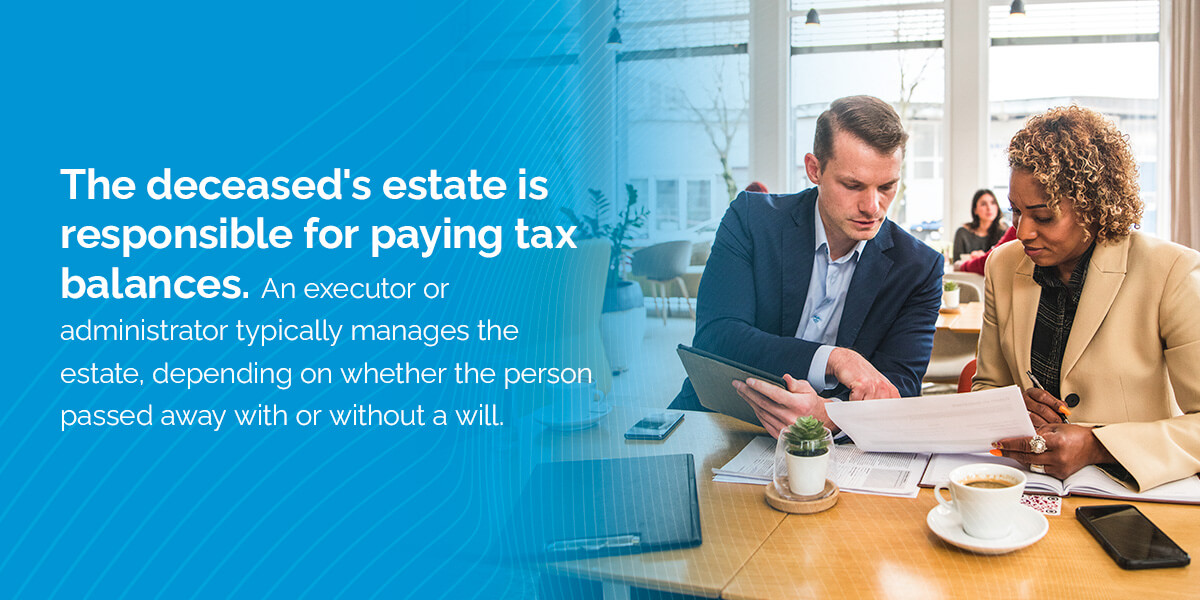
The deceased’s estate is responsible for paying tax balances. An executor or administrator typically manages the estate, depending on whether the person passed away with or without a will. If the deceased names you in their will as an executor and you get probate to administer the estate, you will typically be responsible for paying their taxes from the estate. The administrator will generally assume that responsibility when the deceased dies without a will.
When a person dies, the executor or administrator will commence probate proceedings. Probate must startwithin 30 to 90 daysafter death, depending on state law. The executor or administrator acts as the deceased’s legal representative. They manage the deceased’s assets and pay the taxes from the estate — not their own pockets. However, if the executor or administrator breaches their duty, they may be required to fund the unpaid taxes themselves.For example, if they fail to file or pay taxes on time, whether intentionally or negligently, they may need to pay from their own assets.
Another instance where an executor or administrator may personally fund the deceased’s unpaid taxes is when they are a surviving spouse and file a joint tax return. In that instance, the spouse will likely pay the tax balance, considering that it was their collective responsibility to do so during the deceased’s lifetime. We discuss these taxes in detail later.

Taxes arehigh-priority debts, so the executor must confirm that the estate’s value is sufficient before paying other creditors or transferring properties to beneficiaries. Suppose they fail to do the proper checks and distribute the assets, especially after receiving a notice. In that case, the tax authority can get orders from the court compelling the executor to pay the arrears personally.
Sometimes, a will can determine which accounts should cover unpaid taxes. Without such a provision, the executor can reasonably choose how to pay the tax balance. For example, they may use funds from assets not explicitly designated to a beneficiary or divide the debt among the beneficiaries’ assets proportionally. It all depends on the size and nature of the assets available.
If the deceased created a trust, the trust document can instruct the trustee to pay certain taxes with trust funds if the executor makes a written request. Generally speaking, executors must obey the stipulations in a will or trust as long as the will or trust complies with the law.
Does IRS Debt Get Passed Down?
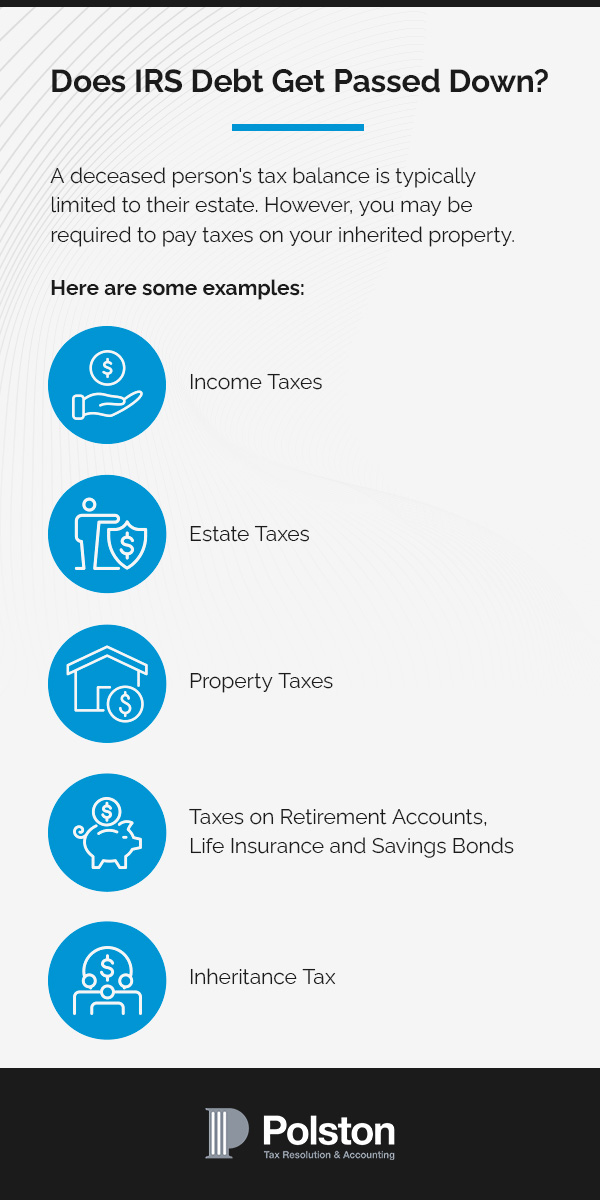 A deceased person’s tax balance is typically limited to their estate. However, you may be required to pay taxes on your inherited property. Here are some examples:
A deceased person’s tax balance is typically limited to their estate. However, you may be required to pay taxes on your inherited property. Here are some examples:
1. Income Taxes
Beneficiaries may be required to pay taxes if they receive income that would have gone to the decedent. For example, Scott completes a painting job for his neighbor but dies before getting paid. The neighbor pays Scott’s daughter, Juliet, after closing the estate. Juliet must report the amount received on her personal tax return and pay the IRS their portion.
It would have been different if Juliet received the money while the estate was still open. In that case, the income would be the estate’s, so the estate would pay any income tax.
2. Estate Taxes
If tax is due on returns or dividends, other than final estate income taxes, the arrears typically fall to the estate. But if the tax is due on the final estate income taxes alone, it will generally pass through the beneficiaries. The reason is that the assets are transferred to the beneficiaries sometime during the last year of the estate’s existence and that income tax liability forms part of the estate assets. Therefore, you must report the income on your income tax returns and pay the taxes accordingly.
3. Property Taxes
Inheriting someone’s property will not automatically make you liable to pay property taxes. However, you may be responsible for taxes if the executor transfers legal title to you with unpaid property taxes. If the will designates a separate account for those debts, the monies in the account will cover the taxes owed.
4. Taxes on Retirement Accounts, Life Insurance and Savings Bonds
Generally, beneficiaries do not pay income taxes on assets they inherit. However, there are exceptions regarding retirement accounts, proceeds from life insurance and savings bond interest.
Inheritance from an individual retirement account (IRA), 401(k) or 403(b) is taxable if the money was tax deductible at the time the decedent contributed. The situation may differ if there are non-deductible contributions in the account. Additionally, a surviving spouse who inherits money from these accounts may roll over the money into their personal accounts to defer taxes. Other beneficiaries may create an “inherited IRA” and pay the taxes owed over time.
Beneficiaries who inherit proceeds from Roth IRAs will typically not pay taxes on withdrawals because the contributions would not have been tax deductible. Also, beneficiaries may not be required to pay taxes on the proceeds that the contributions generate so long as the account is five years old or older.
For life insurance contributions, beneficiaries do not usually pay taxes on the proceeds unless the amount yields interest. This often happens if the beneficiary opts for installment payments. Beneficiaries may also pay taxes if the policy was transferred to them for cash or other valuable consideration.
Finally, beneficiaries who inherit savings bonds may pay taxes if the bonds mature. The same applies if the beneficiaries redeem the bonds after the original owner deferred the tax.
5. Inheritance Tax
Beneficiaries may pay inheritance tax depending on the state, but the federal government does not impose inheritance tax. Inheritance taxes are not taxes passed down to heirs. They are new taxes that arise when someone inherits an asset. For that reason, the beneficiaries pay the taxes instead of leaving it to the estate.
States may levy inheritance taxes based on the value of the assets inherited and the relationship with the decedent. Also, beneficiaries may be required to pay taxes in the state where the decedent lived and the state where the property is located.
What if the Estate Is Insolvent?
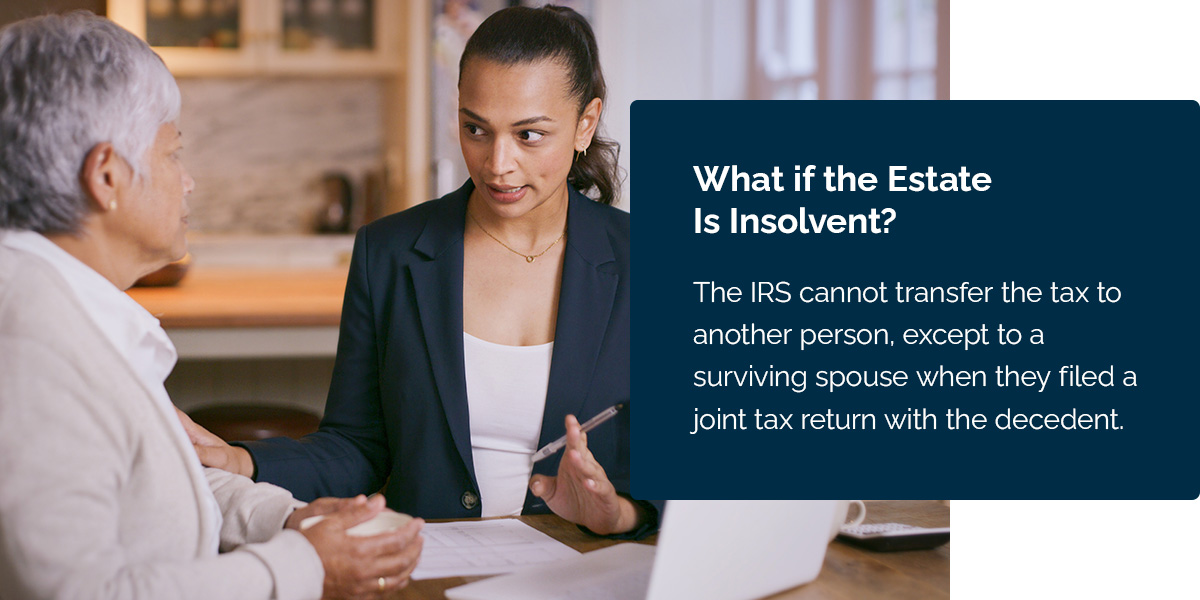
The arrears may go unpaid when there are insufficient funds to pay the decedent’s taxes. The IRS cannot transfer the tax to another person, except to a surviving spouse when they filed a joint tax return with the decedent. In this case, the IRS may collect the tax balance from the decedent’s spouse.
What Happens When You Fail to File the Taxes?
According to IRS regulations, executors and administrators mustfile proper tax returnsfor deceased persons. If they fail to do so, the IRS can hold them personally liable for the unpaid taxes. For example, suppose Ken appointed Barbara as an executor in his will. When Ken passed on, Barbara distributed all the estate to the beneficiaries, ignoring the back taxes. In this case, the IRS can claim the tax balance from Barbara personally.
If there are no executors or administrators, any person with actual or constructive possession of the estate must pay the tax according to the extent of the property’s value in their control.
Can the IRS Take Your Inheritance if You Owe Back Taxes?
The IRS can take your inheritance if you owe back taxes. The reason is that once the executors transfer assets to you, they become part of your estate. So, if you owe back taxes, the tax authority mayresort to aggressive meanslike wage garnishments, asset levies and tax liens. The rule applies to different kinds of assets, including money in bank accounts, real estate property, vehicles and household items. However, the IRS usually requires a court order before taking these steps.
Can a Surviving Spouse be Liable for the Decedent’s Tax Balance?
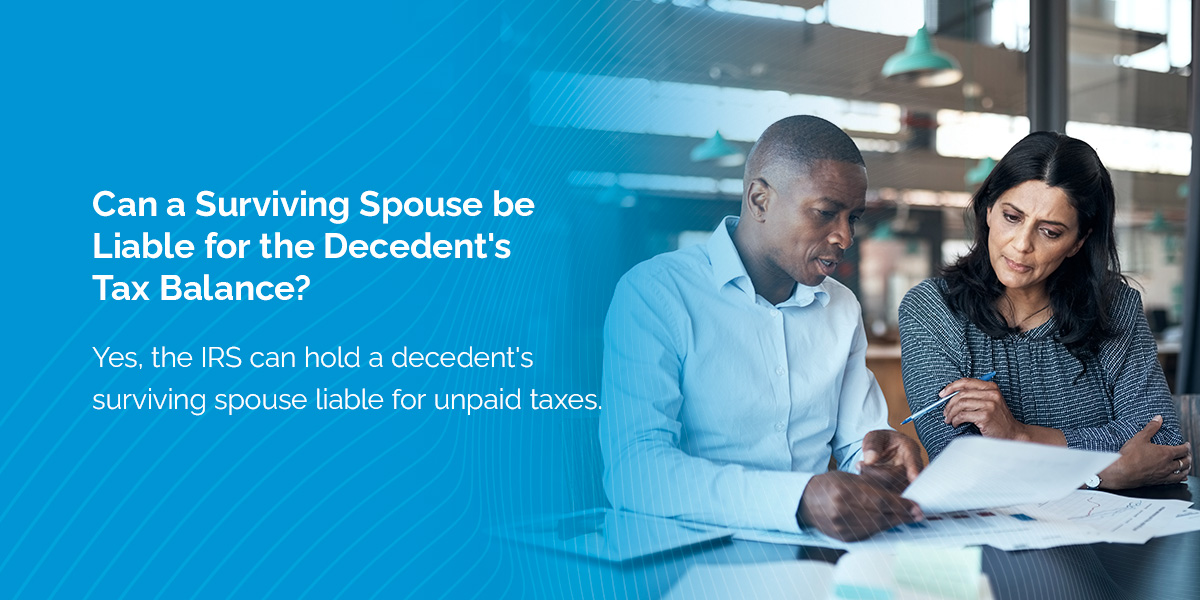
Yes, the IRS can hold a decedent’s surviving spouse liable for unpaid taxes. This can happen when:
- The couple filed a joint tax return.
- The decedent owed back taxes on a return involving a property they co-owned with the surviving spouse that they filed as married filing separately.
- The couple lives in a community property state.
Spouses who believe the IRS is wrongly holding them responsible for their deceased partner’s taxes can apply forinnocent spouse relieffrom the IRS. Innocent spouse relief can protect spouses from paying additional taxes, interest and penalties if the deceased spouse failed to report their income, misreported their income, claimed tax deductions and credits incorrectly, or omitted items on a tax return.
Surviving spouses must meet specific requirements to qualify for the relief. If you think you qualify, it’s best to consult a tax professional to guide you through the process.
A surviving spouse can file a joint tax return for the last year the deceased was alive. Widows or widowers who remarry the same tax year that their spouse died cannot file jointly with their late spouse. They must file a joint tax return with their new spouse or file as married filing separately. The late spouse’s return will be filed as married filing separately.
Spouses can file as a qualifying widow or widower for two tax years following their spouse’s death if they have a qualifying dependent. This status allows spouses to claim standard deductions as a married couple.
How Do You Know How Much Back Taxes a Decedent Owes?
You must contact the IRS and inform them that you are authorized to receive the decedent’s tax records. You can file Form 56 —notice concerning a fiduciary relationship— or send a copy of the court-approved letters of testamentary to the IRS. Include the decedent’s Social Security number, last known address and a copy of the death certificate. Alternatively, you can file Form 15107 —information request for a deceased taxpayer — to request basic information about the decedent.
Next,request a tax transcriptonline by filing Form 4506-T. The tax transcript provides information about the decedent’s previous tax returns and how much they owe. If you want to know how much the decedent owed in back taxes, you can contact the nearest Taxpayer Assistance Center for a payoff number.
What Must You Do When You Know the Decedent Owes Taxes?
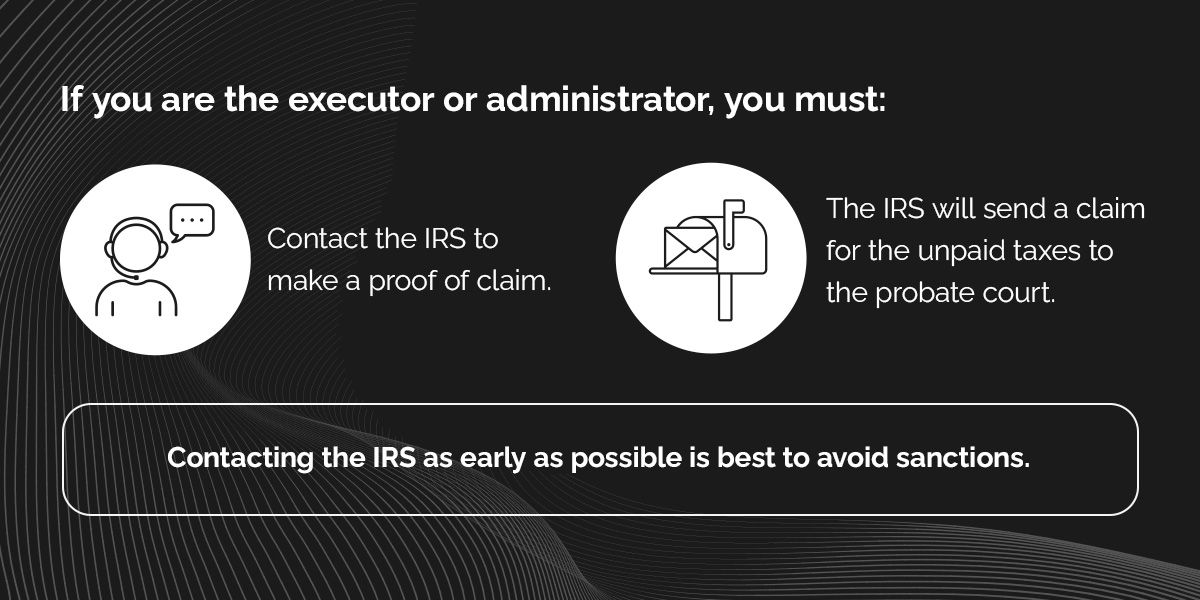
If you are the executor or administrator, you must contact the IRS to make a proof of claim. The IRS will send a claim for the unpaid taxes to the probate court. Contacting the IRS as early as possible is best to avoid sanctions.
How Do You File Taxes for a Deceased Relative?
You can file taxes for a deceased parent or any relative using the same methods required for any taxpayer. Report all income earned until the day of death and make all relevant deductions. As noted earlier, you can file Form 4506-T to get their tax records. You may also need Form 1040 for the individual tax return, 1099s for untaxed income and W-2s for employee income.
If the decedent leaves behind any estate with taxable income, it will be necessary to use Form 1041 — income tax return for Estates and Trusts. You can also use the form for estates with $600 or more in gross income during the particular tax year.
The decedent’s income will count from January 1 of the year of death until the day before they died. The tax deadline is automatically pushed to April 15 of the year after the death. Also, since you are filing the tax return of a deceased relative, you must write “deceased” next to their name.
If you realize there are unfiled taxes for the previous years, you must file them for the decedent. Doing that can prevent interest and penalties from accumulating.
Can You Claim a Refund Owed to a Deceased Taxpayer?

Yes, you can claim a refund owed to a deceased person. The executor can file the decedent’s last tax return and transfer the refund to the estate. A surviving spouse can also file a joint return, claiming refunds due them. Other persons can claim a refund byfiling Form 1310.
How Can a Tax Professional Help?
Hiring a tax professional comes with many benefits. They can help you navigate complex processes, provide tailored advice, implement tax reduction strategies and negotiate with the IRS on your behalf. Let’s consider these in detail:
- Filing taxes:Filing taxes for deceased persons can be complex, but you don’t have to do it alone. Tax professionals have experience helping people in similar situations. You can leverage that expertise to take the load off your shoulders and reduce filing errors.
- Providing tailored advice:Tax solutions can differ depending on the circ*mstances of each case. For example, a person’s current marital and dependency status, the nature of assets inherited and tax balance can completely change the approaches needed to resolve challenges. A knowledgeable tax professional can assess your situation and offer advice suited to your case.
- Reducing tax burdens:Tax professionals can dig deep into the tax laws to find exemptions, credits and deductions that apply to you. These reductions can help decrease your tax liability, potentially saving you significant amounts of money. Tax professionals can also help you plan your estate to minimize tax burdens.
- Negotiating on behalf of relatives or estate:Failing to pay taxes can result in serious complications. In such situations, you may need professional services to examine the tax records and offer practical solutions. The tax professional can represent you effectively if negotiating with the IRS is necessary.
Talk to Polston Tax About Your Deceased Relative’s Unpaid Taxes
Polston Tax is a renowned tax agency that helps people through their tax challenges. We are licensed to practice in every state in the country. Our professionals are well-trained, knowledgeable and caring, with years of experience in the industry.
Contact usnow if a deceased person left behind unpaid taxes. It’s important to know that you are not alone. We can examine your situation and provide practical solutions. We understand your needs and know how to help!
Previous ArticleAssistance for Passport Denial or Revocation Due to Tax Debt Next ArticleNavigating the 2024 Tax Season